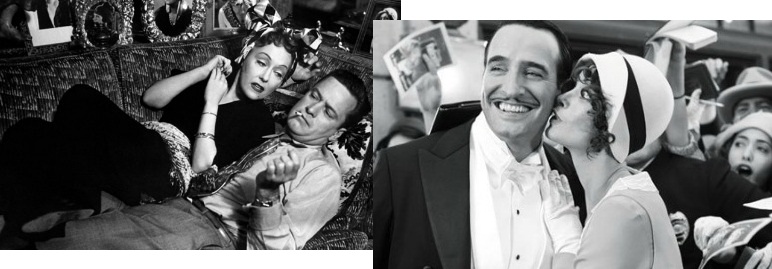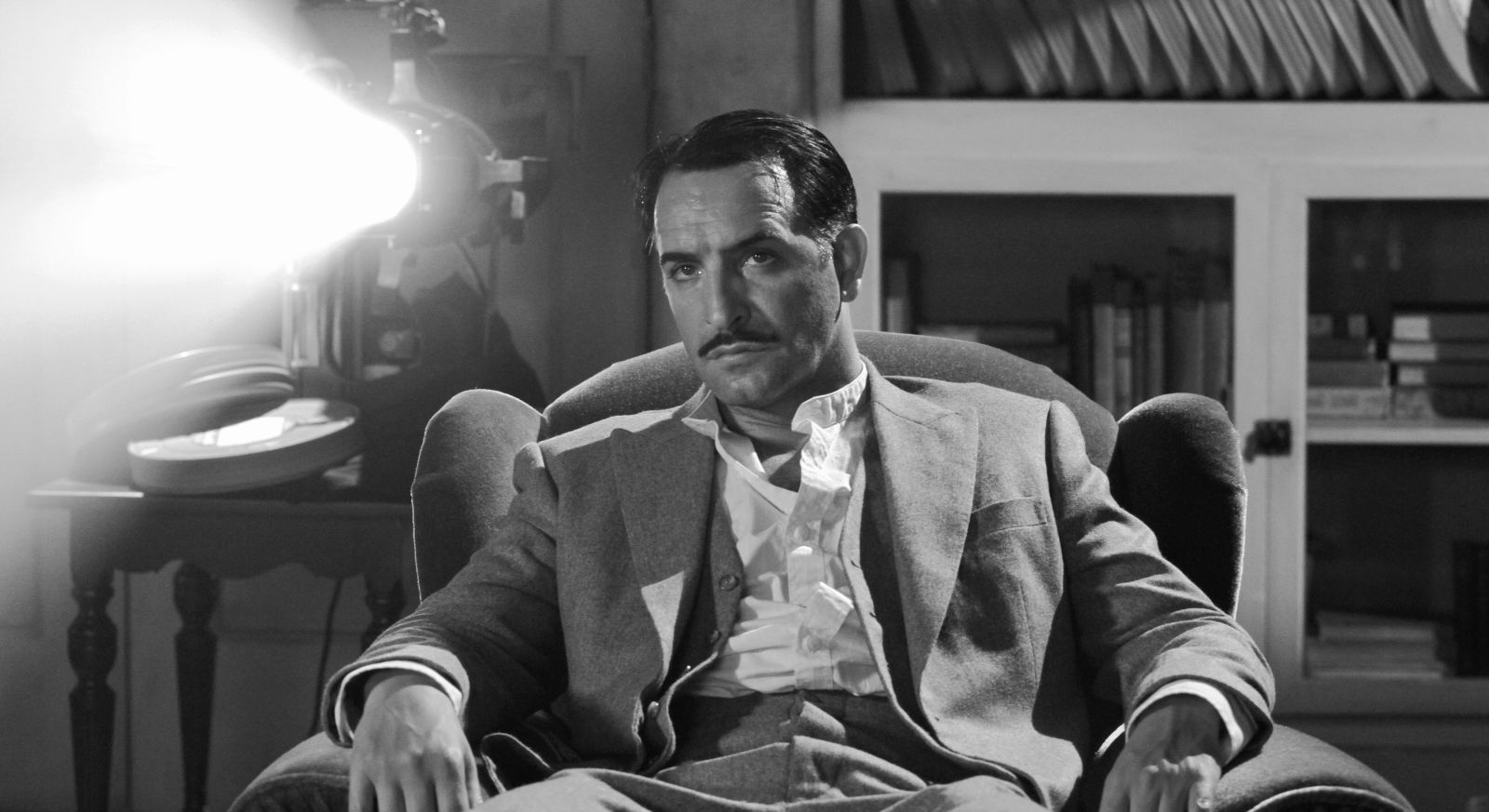Distant Relatives: Sunset Blvd and The Artist
 Thursday, February 9, 2012 at 3:30PM
Thursday, February 9, 2012 at 3:30PM Robert here w/ Distant Relatives, exploring the connections between one classic and one contemporary film.

How does one begin to discuss The Artist in terms of just one distant relative? The film is a paean to all films silent-era Hollywood and enough films stretching far beyond the silent-era including Singin' in the Rain and A Star is Born, to which it owes story elements, Citizen Kane from which it borrows specific conceits and Vertigo... well, we'll leave that one alone. But I think the connection that intrigues me the most is notable not for what the two films have in common, but in how they differ.
The Artist tells the story of dashing silent film actor George Valentin and his fall from grace juxtaposed against rising talkie star Peppy Miller who, in a cruel twist of fate, is an ingenue he discovered. Sunset Blvd enters the world of former silents star Norma Desmond as discovered by aspiring screenwriter Joe Gillis, a world overgrown with bitterness, denial and impending senility.

Sunset Blvd is in a way the anti-Artist. If you started with one similar concept and gave the script to a half-glass-full director and a half-glass-empty director, you'd quite possibly end up with The Artist and Sunset Blvd. The similarities are obvious enough. Both films are about silent stars whose downfalls hasten when "words, words, words" make their way into motion pictures, soon making them quite irrelevant. George Valentin and Norma Desmond suffer the same fate, and the requisite eventual drinking and depression. The only difference is, Norma's "savior" finds her many years too late.
I use the term "savior" pretty liberally here, since this is where the films' paths really start to diverge. Peppy and Joe have enough in common. They're young. They're attractive. They're eager to make it into show business. And they have the one thing that Valentin and Desmond do not: potential. Now keep in mind, that's only true as defined by their genres. In a film noir, potential is a hack and a cynic stumbling into a good idea. In a feel-good film it's the rise of a dreamer.
However, these two have polarized motives. Gillis (our hero mind you) is in it for himself. He's using Norma's help to propel his success. Peppy quite contrarily is using her success to help George. And herein lies the reason these films reach their different conclusions, not to mention the reason why one of them is on it way to the Best Picture Oscar while the other didn't win the prize.

It's about appreciation. Peppy appreciates the classics, the silents, the stars. She loves them as we love them. And as our hero (if we can call her that since Valentin doesn't do anything active to save himself) this love propels her to be one of the most decent, morally unimpeachable movie characters in recent years. And then there's Joe. Joe Gillis doesn't care, and vicariously through him, nor do we, and even further than that Sunset Blvd suggests that very few do, and nowhere included in that few is anyone in show business. It's a dark, cynical accusation that no one cares about the old "wax museum" of stars whose talent built up the picture business. It's a sentiment that's not particularly easy to vote for even if it happens to lead a film that is both brilliant and in many ways, honest.
Which makes me wonder, has much changed since 1950? Certainly we now have home video, we have streaming and the internet. The brilliance of the slient era is more accessible than it's ever been, and that allows for a sizable fanbase. And what about within the world of The Artist? Valentin's discovery of Peppy originally seems like a spoonfull of irony but turns out to be uplifting cinematic karma. If she were not there to save him, would anybody? Would Valentin end up just like Norma Desmond? Would The Artist become a cautionary tale instead of an inspirational one?
The Artist was made in 2011 and takes place in the late twenties, early thirties. Sunset Blvd was made in 1950 and takes place in 1950. Therein may lie the ultimate clue to why these very similar films reach very different conclusions. Nostalgia is always inspirational. Reality, not so much.
 Distant Relatives,
Distant Relatives,  Sunset Blvd,
Sunset Blvd,  The Artist
The Artist 


Reader Comments (5)
Robert I love those last two sentences - a great conclusion. I've been wondering myself why nostalgia and period pieces seem more pervasive than ever at the movies, particularly when those pieces are not accurate depictions of those periods, but generally pure fantasies. (Not that there's anything wrong with fantasy per se - it's part of what films are about.) But it seems we can only fantasize if a film is set in the past, or filled with CGI.
Sunset Blvd remains one of my all-time favorites. If I'm not as excited about the notion of making the stage musical into a play as some readers here are, it's simply because I think this is one film (and performances) that CANNOT be bettered.
Fascinating write up. I finally saw The Artist yesterday, and it certainly brought to mind Singin' in the Rain, Sunset Blvd, and even All About Eve, though Peppy is certainly no Eve Harrington.
Janice: as I asked those questions during my viewing of The Artist, I wondered if it were a gilded age thing. As in, there are parallels between the economics of the 2 periods (then and today), and it's not nostalgia as much as sly commentary. I guess I'd like to think the commentary has something to do with comparing eternal optimism to the reality of downsizing and being replaced by technology. The movie only works for me if I convince myself that the idealized nostalgia comes with an ironic self-awareness on the part of the filmmakers. And then if I can believe all that's true, I love the movie a lot.
Hmm. Sunset Boulevard. Undeniably the best film of it's year, but I'd give both the lead performances the silver as far as acting. Norma is a deliciously over the top creation, and Swanson is brilliant for doing it, but I'd personally give the gold in that category to the surviving wife from Rashomon, who has to be completely convincing in the evocation of multiple people's conception of a single character. And then there's Holden's Gillis. He's very good in his part and knows exactly what is needed physically and verbally to convice you in this character. However, there's James Stewart's light, fluffy Hollywood star turn in Harvey. Stunning fountains of energy and passion poured into what is probably his last major comedic role in a worthwhile film. Although Koster's direction is nothing that special and the rest of the cast just barely hit above average, I think Stewart's performance is SO FREAKING GOOD I'm still comfortable saying that Harvey is nothing short of an A. So, yeah, he wins Lead Actor in my book.
Good article, I wrote something very similar a couple of days ago. Check it out if you're interested.
http://xoferbean.blogspot.com/2012/02/normal-0-0-1-2160-12314-102-24-15122-11.html
Why The Artist doesn't (quite) deserve all the Oscars it will (probably) win